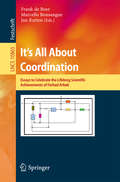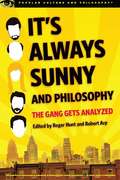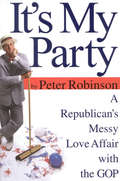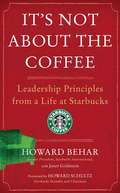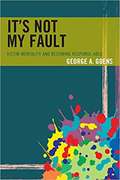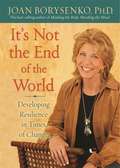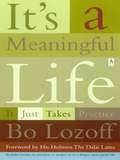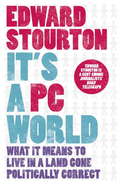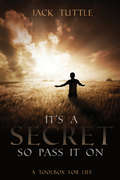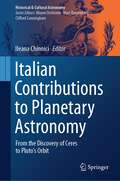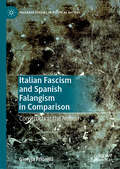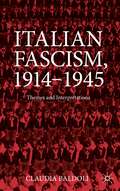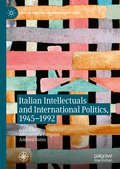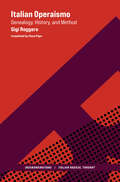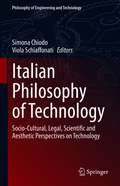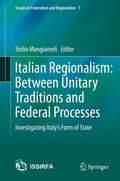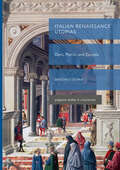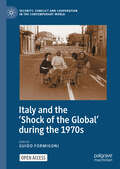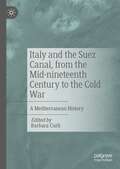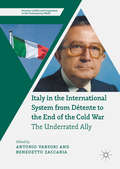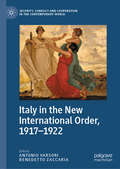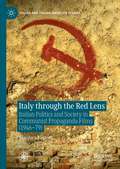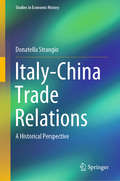- Table View
- List View
It's All About Coordination: Essays Dedicated To Farhad Arbab On The Occasion Of His 65th Birthday (Theoretical Computer Science and General Issues #10865)
by Marcello Bonsangue Frank De Boer Jan RuttenThis Festschrift volume has been published to celebrate the lifelong scientific achievements of Farhad Arbab on the occasion of his retirement from the Centre of Mathematics and Computer Science (CWI).Over the years Farhad Arbab has sucessfully been engaged in scientific explorations in various directions: Software Composition, Service Oriented Computing, Component-based Software, Concurrency Theory, Coordination Models and Languages, Parallel and Distributed Computing, Visual Programming Environments, Constraints, Logic and Object-Oriented Programming.Farhad Arbab has shaped the field of Coordination Models and Languages. His insight that it is all about exeogeneous coordination gave rise to the striking elegance and beauty of Reo: an exogenous coordination model based on a formal calculus of channel composition. Reo has been extremely successful and is having a great impact in many of the areas mentioned above.The present volume collects a number of papers by several of Farhad’s close collaborators over the years.
It's Always Sunny and Philosophy: The Gang Gets Analyzed
by Robert Arp Roger HuntPhilosophers wittily and expertly uncover amazing philosophical insights from the endlessly fascinating TV show, It's Always Sunny in Philadelphia.Littmann shows how the values of the gang are the same as those of Homeric heroes. <P><P>Ketcham argues that the Church should make Charlie a saint, partly because It's Always Sunny is "all about free will." Hamer shows how closely the gang's activities comply with the scientific method. Alkema and Barkman analyze the way the gang perceives happiness and how they try to get it. Leonard proves beyond doubt that the game of Chardee MacDennis reveals everyone's unconscious desires. King examines the morality of the gang's behavior by the standard of how they respond to extreme suffering. Chambers agrees that each of the five central characters is a terrible person, but argues that, given their circumstances, they are not truly to blame for their actions. Tanswell demonstrates that many of the gang's wrong actions result not from immoral motives but from illogical thinking. Aylesworth uses examples from It's Always Sunny to bring out some of the moral problems with real consent to sex. Jones reveals that Nietzsche foresaw everything the gang at Paddy's Pub would do.
It's My Party: A Republican's Messy Love Affair with the GOP
by Peter RobinsonMy views were Republican, I voted Republican, I worked in a White House that was Republican. I had to admit it. I was as Republican as they come. That may have been obvious to you, but it came as a rude awakening to me. IT'S MY PARTY After Ronald Reagan, after George Bush, after Bill Clinton, where is the Republican Party headed today? This is exactly the question former White House speechwriter and special assistant to the president Peter Robinson asked himself--and the answers he discovered surprised even him. IT'S MY PARTY is part irreverent memoir, part "travel diary," and part impassioned call to arms. In it, Robinson shows just what the GOP has got going for it--and how its most triumphant years are yet to come. Along with Robinson's personal, and sometimes hilarious, lifelong relationship with Republicanism, IT'S MY PARTY takes us through history and geography to trace the party's roots. It pushes the hot buttons of headline issues that other political professionals are afraid to touch. It introduces us to both the party's leaders and its foot soldiers, from George Bush, Sr. to Rep. Chris Cox, from Newt Gingrich to Bret Schundle
It's Not About the Coffee: Leadership Principles from a Life at Starbucks
by Howard Behar Janet Goldstein"At Starbucks, the coffee has to be excellent, from the sourcing and growing to the roasting and brewing. The vision has to be inspiring and meaningful. Our finances have to be in order. But without people, we have nothing. With people, we have something even bigger than coffee." During his many years as a senior executive at Starbucks, Howard Behar helped establish the Starbucks culture, which stresses the importance of people over profits. He coached hundreds of leaders at every level and helped the company grow into a world-renowned brand. Now he reveals the ten principles that guided his leadership--and not one of them is about coffee. Behar starts with the idea that if you regard employees and customers as human beings, everything else will take care of itself. If you think of your staff as people (not labor costs) they will achieve results beyond what is thought possible. And if you think of your customers as people you serve (not sources of revenue) you'll make a deep connection with them, and they'll come back over and over. This approach has been integral to Starbucks from the start, and remains so today. Behar shares inside stories of turning points in the company's history as it fought to hang on to this culture while growing exponentially. He discusses the importance of building trust, facing challenges, daring to dream, and other key principles, such as: Know Who You Are: Wear One Hat. When organizations are clear about their values, purpose, and goals, they find the energy and passion to do great things. Think Independently: The Person Who Sweeps the Floor Should Choose the Broom. We need to get rid of rules--real and imagined--and encourage the independent thinking of others and ourselves. Be Accountable: Only the Truth Sounds Like the Truth. No secrets, no lies of omission, no hedging and dodging. Take responsibility and say what needs to be said, with care and respect. Take Action: Think Like a Person of Action and Act Like a Person of Thought. Find the sweet spot of passion, purpose, and persistence. "It's all about the people" isn't an idea, it's an action. Feel, do, think. Find the balance, but act. Behar believes that as work becomes less hierarchical and as the world economy becomes more and more about relationships and connecting, the principles of personal leadership are more important than ever. This book will show you the way.
It's Not My Fault: Victim Mentality and Becoming Response-able
by George A. GoensAll children have hopes and dreams. Their innocent optimism from their early years to working their way through school is inspiring. The responsibilities of educators and parents are to help children be ‘response-able’ in facing the challenges of life. A victim mentality eliminates any hope of successfully meeting their aspirations and dreams. <p><p> Children face obstacles -- some are daunting and others the normal ups and downs of childhood. Parents and others have an obligation to help children grow into maturity and learn that they can act in positive ways in good as well as in hard times. To reject the ability to live a life they have imagined results in a life lost, along with its potential and possibilities. <p><p> To be successful, children cannot adopt a victim mentality. When confronted with challenges, character matters -- responding effectively to address life’s challenges. Schools must teach character development in an environment that holds children responsible and accountable. We all have only one life to live and we are able to respond to achieve an imagined life.
It's Not the End of the World: Developing Resilience in Times of Change
by Joan BorysenkoThe world is in crisis, but you don't have to be. We all know resilient people who bounce back from hardship and create their best lives. That's the promise of change. Other people stress out and melt down, losing hope and health. That's the danger in times of change. The good news is that resilience isn't a genetic gift for the lucky few. It's an easily understood skill that anyone can practice and master. Resilient people face reality head on, take action, find deeper meaning in life, laugh often, and are masters of improvisation. A new kind of natural selection is already having its way with us. Hopeful, stress-hardy people will rule the world. And as change and uncertainty escalate, those prone to stress will be less able to compete. This book by Joan Borysenko is the key you need to step into a bold new future that works for us all.
It's a Meaningful Life
by Bo LozoffLozoff, whom the Utne Reader has named one of the nation's 100 Spiritual Visionaries, has written a compelling criticism of the anomic era in which we live. In our age, Lozoff writes, we don't take the time to enjoy everyday pleasures, such as having dinner with family or watching the sun set. "Our civilization", he writes, "is in serious trouble": consumerism runs rampant, and people are increasingly estranged from one another. It is his contention that integrating simple spiritual practices into our daily lives can help make life more satisfying and meaningful. Lozoff does not prescribe certain spiritual practices that he thinks every person ought to undertake. Rather, drawing on a wealth of traditions from Tibetan Buddhism to Hasidic Judaism, the author presents an appealing pastiche of practices from prayers to breathing exercises. Readers will learn about classic mantras (Om mani padme hum, the Tibetan Mantra of Compassion and the Jesus Prayer) and more contemporary ones, such as "No hardfeelings". But Lozoff's daily practices are not limited to the obviously spiritual -- in his discussion of "living simply", he urges readers to
It's a PC World
by Edward StourtonAlmost all of us have a hobby horse we like to ride into battle against Political Correctness, and yet the PC phenomenon just seems to keep on growing, touching every facet of our lives from our pleasures to our politics. Why? Could it be that this much derided scourge of the modern world contains a germ of goodness? Edward Stourton finds examples in all walks of life ? and explodes a few myths along the way. His witty and thought-provoking manoeuvres through the pros and cons of PC are both entertaining and at times unexpectedly disturbing.
It's a PC World
by Edward StourtonAlmost all of us have a hobby horse we like to ride into battle against Political Correctness, and yet the PC phenomenon just seems to keep on growing, touching every facet of our lives from our pleasures to our politics. Why? Could it be that this much derided scourge of the modern world contains a germ of goodness? Edward Stourton finds examples in all walks of life – and explodes a few myths along the way. His witty and thought-provoking manoeuvres through the pros and cons of PC are both entertaining and at times unexpectedly disturbing.
It's a Secret, So Pass it On
by Jack L. TuttleInsight. Peace. Connection. Happiness. Answers. Drawing on lessons, experiences, and information garnered across a lifetime, "It's a Secret, So Pass it On" illuminates that the spiritual world is closer than you think. The connections humans so fervently search for, year to experience, are within us, within Nature. However, you first have to get beyond your self-imposed limits, your predetermined expectations---you have to open your mind and soul to the possibility of connection. "It's a Secret, So Pass it On," will help you balance this eternal equation of life, peace, and spirituality. Discover your true self and strengthen your internal and external connections through this transformational journey.
Italian Contributions to Planetary Astronomy: From the Discovery of Ceres to Pluto's Orbit (Historical & Cultural Astronomy)
by Ileana ChinniciThis book describes the most important contributions of Italian astronomers to the development of planetary astronomy during the nineteenth century and the early part of the twentieth century. This journey through what may be regarded as the golden era of Italian astronomy commences with the discovery of Ceres, the first asteroid, now classified as a dwarf planet, and culminates in the role played by the Padua Observatory in calculating Pluto’s orbit in the 1930s. Along the way, a wealth of information is provided on the discovery of many comets and asteroids, early spectroscopic observations, drawings of planets and comets, calculations of orbits and ephemerides, and much more. The contributions of such famous figures as Giovanni Schiaparelli, Giovanni Battista Donati, Angelo Secchi, and Annibale De Gasparis are fully explained. Many of the described results are still of interest for modern astronomy, and the book appeals to a wide readership, including scholars, historians, astronomers, and the general public.
Italian Fascism and Spanish Falangism in Comparison: Constructing the Nation (Palgrave Studies in Political History)
by Giorgia PriorelliThis book compares the Italian Fascist and the Spanish Falangist political cultures from the early 1930s to the early 1940s, using the idea of the nation as the focus of the comparison. It argues that the discourse on the nation represented a common denominator between these two manifestations of the fascist phenomenon in Mussolini’s Italy and Franco’s Spain. Exploring the similarities and differences between these two political cultures, this study investigates how Fascist and Falangist ideologues defined and developed their own idea of the nation over time to legitimise their power within their respective countries. It examines to what extent their concept of the nation influenced Italian and Spanish domestic and foreign policies. The book offers a four-level framework for understanding the evolution of the fascist idea of the nation: the ideology of the nation, the imperial projects of Fascism and Falangism, race and the nation, and the place of these cultures in the new Nazi continental order. In doing so, it shows how these ideas of the nation had significant repercussions on fascist political practice.
Italian Fascism, 1914-1945: Themes and Interpretations
by Claudia BaldoliThis is the first book on Italian Fascism to analyse the rich historiography written in Italian for the benefit of the English-speaking students. Claudia Baldoli clarifies the most important research and debates from the origins of Fascism to the ways in which it is remembered today.
Italian Intellectuals and International Politics, 1945–1992 (Italian and Italian American Studies)
by Alessandra Tarquini Andrea GuisoItalian intellectuals played an important role in the shaping of international politics during the Cold War. The visions of the world that they promulgated, their influence on public opinion and their ability to shape collective speech, whether in agreement with or in opposition to those in power, have been underestimated and understudied. This volume marks one of the first serious attempts to assess how Italian intellectuals understood and influenced Italy’s place in the post–World War II world. The protagonists represent the three key post-war political cultures: Catholic, Marxist and Liberal Democratic. Together, these essays uncover the role of such intellectuals in institutional networks, their impact on the national and transnational circulation of ideas and the relationships they established with a variety of international associations and movements.
Italian Operaismo: Genealogy, History, Method (Insubordinations: Italian Radical Thought)
by Gigi RoggeroAn accessible, introductory presentation of operaismo, one of the most important revolutionary theories and praxes of the twentieth century.&“Operaismo is a Machiavellian return to first principles: it is a return to Marx against Marxism, against its tradition of determinism, historicism, and objectivism. Operaismo isn&’t a heresy within the Marxist family, it is a rupture with that family.&”—extract from Italian Operaismo This accessible, introductory presentation of operaismo (or &“workerism&” in English) arms readers with a deeper understanding of the concepts, context, and history of one of the most important revolutionary theories and praxes of the twentieth century. While the ideas of some of its proponents—above all, Antonio Negri—have circulated widely in the English-speaking world over the past twenty years, rather less is known about the context from which (and against which) these perspectives originally emerged. Gigi Roggero here introduces that broader workerist project, and examines how its various analyses of modern social structures, and the possibility for changing them, related to a potent social movement in Italy during the 1960s and 1970s. Italian Operaismo provides a clear overview of the central moments in that tendency&’s development—from the Italian labor movement&’s crisis of direction in the 1950s, the encounter with the &“new forces&” within the working class at FIAT and elsewhere in the early 1960s, and the political journals Quaderni rossi and Classe operaia, to the experience of Potere Operaio and other organizations a decade later. For readers more familiar with this story, the book provides a rereading of operaismo that is both salutary and provocative, one that stresses above all the role within it of subjectivity and political engagement, demonstrating the continued relevance of its subversive method as a tool for reworking the categories of radical and revolutionary thought. This book will serve as a compact, essential work on how to go about eliminating the gap between theory and practice.
Italian Philosophy of Technology: Socio-Cultural, Legal, Scientific and Aesthetic Perspectives on Technology (Philosophy of Engineering and Technology #35)
by Viola Schiaffonati Simona ChiodoThis is the first volume about the Italian philosophy of technology written in English and including novel and translated contributions. The volume presents original research on emerging topics in the field, as well as an overview of the most distinguished Italian approaches to the philosophy of technology. While offering both historical and political perspectives and the contributions of the philosophy of law, philosophy of science, and aesthetics, Italian Philosophy of Technology promotes a novel view on the intersection between continental and analytic traditions in the philosophy of technology.
Italian Regionalism: Between Unitary Traditions and Federal Processes
by Stelio MangiameliThe object of this book is to describe the institutional modifications of the Italian form of state more than ten years after the review of Title V - Part II of the Italian Constitution - for an audience that goes well beyond the Italian national boundaries. The fifteen essays that make up the book discuss the birth and evolution of the Italian regionalism (including those regions with Special Statutes) as well as reforms of 1999-2001. A particular attention is devoted to the role of autonomy in defining regional statutes, regional forms of government, and regulatory and administrative powers. These are subjects on which there is by now an abundant body of constitutional case law, which is extensively referred to by the chapters. The role of the regions vis-à-vis the local bodies and vis-à-vis the European and international order is also discussed, as the right to negotiate with foreign powers has now been conferred on the regions. Lastly, the volume presents contributions on regional finance and on the new law on fiscal federalism, as well as on regional powers in the area of health and welfare.
Italian Renaissance Utopias: Doni, Patrizi, and Zuccolo (Palgrave Studies in Utopianism)
by Antonio DonatoThis book provides the first English study (comprehensive of introductory essays, translations, and notes) of five prominent Italian Renaissance utopias: Doni’s Wise and Crazy World, Patrizi’s The Happy City, and Zuccolo’s The Republic of Utopia, The Republic of Evandria, and The Happy City. The scholarship on Italian Renaissance utopias is still relatively underdeveloped; there is no English translation of these texts (apart from Campanella’s City of Sun), and our understanding of the distinctive features of this utopian tradition is rather limited. This book therefore fills an important gap in the existing critical literature, providing easier access to these utopian texts, and showing how the study of the utopias of Doni, Patrizi, and Zuccolo can shed crucial light on the scholarly debate about the essential traits of Renaissance utopias.
Italy and the 'Shock of the Global' during the 1970s (Security, Conflict and Cooperation in the Contemporary World)
by Guido FormigoniThis open access book explores how Italy experienced the crucial period of transition that has come to be known as the ‘Shock of the Global’ during the 1970s. This decade marked a change between the prevailing socio-political and economic structures of the post-war world – the ‘golden age’ of national and Fordist capitalism – and a new horizon which would become much more integrated at a global and transnational level. Drawing from a diverse range of sources, the collection focuses on the perceptions of the crisis and the novelties of the globalization process, as well as the complex process of adjustment that occurred as a result, revealing how events during the 1970s impacted Italy’s collective mentality, its social groups, political parties and culture. Comprising 23 brief chapters, each examining a symbolic event of the decade, this book acts as a starting point for studying the Italian perception of international change. An insightful read for anyone researching modern Italian history, globalization or transnational history, this book demonstrates how Italian culture, society and politics reacted to international stimuli from abroad during the 1970s.
Italy and the Suez Canal, from the Mid-nineteenth Century to the Cold War: A Mediterranean History
by Barbara CurliConceived in the 1850s and opened to navigation in 1869, the Suez Canal’s construction coincided with Italy’s path to unification and its first foray into nineteenth-century globalization. Since then, the history of Italy and the Canal have intertwined in many ways, throughout in peace and war. This edited collection explores the fundamental technical, diplomatic and financial contributions that Italy made to the production of the Canal and to its subsequent development, from the mid-nineteenth century to the Cold War. Drawing from unpublished public and private archival sources, this book is the first comprehensive account of this long and multifaceted relationship, providing innovative perspectives on Italy’s diplomatic, economic, social, colonial and cultural history. An insightful read for those studying maritime, diplomatic or Italian history, this book contributes to a growing body of research on the Canal, which has largely emerged from international business, labour and social history, and offers new insights into the Euro-Mediterranean region.
Italy in the International System from Détente to the End of the Cold War
by Benedetto Zaccaria Antonio VarsoriThis edited collection offers a new approach to the study of Italy’s foreign policy from the 1960s to the end of the Cold War, highlighting its complex and sometimes ambiguous goals, due to the intricacies of its internal system and delicate position in the fault line of the East-West and North-South divides. According to received opinion, during the Cold War era Italy was more an object rather than a factor in active foreign policy, limiting itself to paying lip service to the Western alliance and the European integration process, without any pretension to exerting a substantial international influence. Eleven contributions by leading Italian historians reappraise Italy’s international role, addressing three complex and intertwined issues, namely, the country’s political-diplomatic dimension; the economic factors affecting Rome’s international stance; and Italy’s role in new approaches to the international system and the influence of political parties’ cultures in the nation’s foreign policy.
Italy in the New International Order, 1917–1922 (Security, Conflict and Cooperation in the Contemporary World)
by Benedetto Zaccaria Antonio VarsoriThis edited collection offers the first systematic account in English of Italy’s international position from Caporetto – a major turning-point in Italy’s participation in the First World War – to the end of the liberal regime in Italy in 1922. It shows that after the ‘Great War’, not only did Italy establish itself as a regional power but also achieved its post-unification ambition to be recognised, at least from a formal viewpoint, as a great power. This subject is addressed through multiple perspectives, covering Italy’s relations and mutual perceptions vis-à-vis the Allies, the vanquished nations, and the ‘New Europe’. Fourteen contributions by leading historians reappraise Italy’s role in the construction of the post-war international order, drawing on extensive multi-archival and multi-national research, combining for the first time documents from American, Austrian, British, French, German, Italian, Russian and former Yugoslav archives.
Italy through the Red Lens: Italian Politics and Society in Communist Propaganda Films (1946–79) (Italian and Italian American Studies)
by Gianluca FantoniThis book offers the first comprehensive analysis of the role of cinema in the communication strategy of the Italian Communist party (the PCI). It examines the entire period during which the party had a systematic and organized approach to cinematographic production, starting with the early experiments in 1946 and concluding with the closure of PCI film company Unitelefilm at the end of the 1970s. Its analysis sheds light on a range of issues, such as the relationship between the party and Italian intellectuals, the Stalinist imprint of the Italian Communist Party and the historical significance of the Salerno turn, the PCI’s relationship with the student movements in 1968 and 1977, and the PCI’s response to the rise in political violence in the 1970s. Ultimately, the book demonstrates that cinema was essential to the PCI’s propaganda effort.
Italy-China Trade Relations: A Historical Perspective (Studies in Economic History)
by Donatella StrangioThis book examines the political connections and trade relations between Italy and China, with particular emphasis on the second half of the 19th century and the period following the Second World War. In recent years, economic relations between the two countries have intensified as a result of increasing exchange and trade agreements, with positive impacts on their political and diplomatic relations. By studying original public sources such as the Archives of the Italian Ministry of Foreign Affairs, the Bank of Italy and the Central State Archives in Rome, the author offers a historical perspective on the evolution of the two countries’ economic and political ties. The respective chapters address e.g. the role of international governmental authorities, the role of the Italian Bank of China, the impact of trade agreements and foreign investment projects, etc. Given its scope, the book will appeal to scholars of economic history and international economics, as well as political scientists and legal scholars with an interest in international diplomacy and trade agreements.
Iterative Conceptions of Set (Elements in the Philosophy of Mathematics)
by Neil BartonMany philosophers are aware of the paradoxes of set theory (e.g. Russell's paradox). For many people, these were solved by the iterative conception of set which holds that sets are formed in stages by collecting sets available at previous stages. This Element will examine possibilities for articulating this solution. In particular, the author argues that there are different kinds of iterative conception, and it's open which of them (if any) is the best. Along the way, the author hopes to make some of the underlying mathematical and philosophical ideas behind tricky bits of the philosophy of set theory clear for philosophers more widely and make their relationships to some other questions in philosophy perspicuous.
